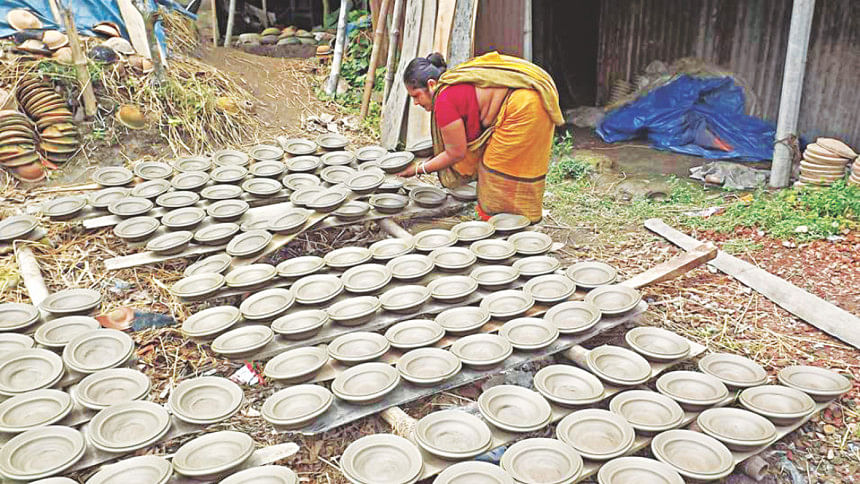Hard times for Bogra potters

Tubs, curd-pots, dolls and idols: for many generations the locality of Paulpara in Aria union of Bogra's Shajahanpur upazila has been synonymous with pottery. Locally hundreds of families of the Paul caste, after which the locality is named, continue to practice and pass on refined artisan skills. Practical, decorative or sacred, with the many clay items available it's not readily apparent how precarious their livelihood has become.
“We used to collect clay from the nearby river and local ponds,” says potter Uzzal Paul. “But nowadays we have to buy it at a cost of Tk 300 per van [rickshaw-van] load.” His colleagues Baccu and Shymoli Paul agree that the additional expense is one factor squeezing profits.
In addition, pots and containers made of plastic and other materials compete with traditional clay in the market. Plastic wares are cheap and often considered more convenient than clay ones by consumers.
“We are trying to save the profession of our forefathers,” says Baccu Paul, “But it might not be possible.” Within four months, with effort, a potter can make around 3,000 curd pots which after firing will currently sell for Tk 12,000. After costs, it's not a great income upon which to run a family.
“I can't pay for school supplies for my children anymore,” admits another potter, Shusanto Paul. “My financial position has steadily deteriorated over the past few years.”
The inability to fund their children's school and college life is a sharp blow in a community that has come to highly appreciate the benefits of education. Budgets are so tight that even buying food supplies requires careful consideration.
To make matters worse, a few months ago the area was attacked by local thugs led by one Morshed who hoped to extort money from the community. Many clay items in stock were vandalised. Fortunately police arrested those responsible and they were sent to gaol, the artisans added. But to family economies much damage was done.
With no easily manageable new loan facilities, and often needing to make repayments on existing loans, most families have had no choice but to weather the hard times.
As a result of these pressures, many families have needed to skip meals for the lack of cash flow, and increasingly they rely on freely available vegetables like taro and spinach to supplement diets. Many hope that any money saved on food can be invested in clay supplies to help them get back on their feet.
Nonetheless artisans Onjoli Paul, Gita Rani Paul, Chaina Paul, Deblarani Paul and others meanwhile, fear that without assistance or a significant change in fortunes soon, the centuries-old pottery industry will be gone.
Yet they have little choice but to try and save the tradition, to work as potters until their last breath. Other than their pottery skills, most have a few other assets.
Gobinda Kumar Paul, secretary of the local temple, says the community has had assurances of monetary help from both government authorities and non-government organisations, but thus far no assistance has materialised.
Ideally, the Pauls hope not only for more flexible loan facilities but training in modern pottery methods so they can further develop what is more than just a profession, also being a cherished heritage, not less than a part of self and community identity.

 For all latest news, follow The Daily Star's Google News channel.
For all latest news, follow The Daily Star's Google News channel. 



Comments